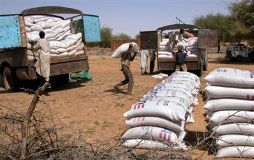Darfur rebels agree with Sudan on aid framework
ABUJA, Sept 1 (Reuters) – Darfur rebels and the Sudan government agreed on Wednesday to give greater access to humanitarian agencies trying to address the crisis in the desert region, officials said.
 The two sides have been trying to thrash out a deal at peace talks, brokered by the African Union in the Nigerian capital Abuja, to address what the United Nations has described as the world’s worst humanitarian crisis.
The two sides have been trying to thrash out a deal at peace talks, brokered by the African Union in the Nigerian capital Abuja, to address what the United Nations has described as the world’s worst humanitarian crisis.
They agreed to work towards greater access for humanitarian agencies, more efforts to protect civilians, greater efforts to monitor the ceasefire effectively, and to set up a joint humanitarian monitoring unit in the Darfur capital el-Fasher.
But security issues, such as disarmament, would be tackled later, officials said.
“We agreed on what came in the last draft presented by the African Union. We will sign an agreement when we conclude the security issues,” said rebel negotiator Ahmed Mohammed Tugod, of the Justice and Equality Movement (JEM) rebel movement, leaving the end of talks.
Tugod said rebels had temporarily dropped earlier demands that the government use revenues from its 320,000 barrel per day oil production to pay for additional humanitarian aid.
The talks have been dogged by mutual accusations of ceasefire violations since they started over a week ago.
The United Nations estimates at least 50,000 people have been killed in the conflict which started 18 months ago after years of low-intensity fighting between mainly African farmers and Arab nomads.
Over a million people have been forced to flee their homes from attacks by pro-government Arab Janjaweed militia, used as auxiliaries by the Sudan government in their quest to crush the rebels.
On Wednesday U.N. Secretary General Kofi Annan said Sudan had made progress on reining in the Janjaweed but had failed to ensure African villagers were fully protected.
The Sudan government say they do not back the Janjaweed, who they call outlaws.
U.N. aid agencies have said the humanitarian situation is worsening with civilians still vulnerable to attacks and disease and heavy rains compounding the misery and creating impossible conditions for aid convoys.
